One of the things I get asked quite often is, “How do you store home canned food and what do you do with all those mason jars?” I get it, most of us are used to shopping for just a week or two at a time and the thought of having to store a years worth of tomatoes can be overwhelming. I’m here to tell you that canning storage can be found in even the smallest of homes.
Properly storing canned goods will ensure that your canning efforts aren’t wasted or destroyed. It also ensures that your reusable canning supplies are readily available next time you want to can something.
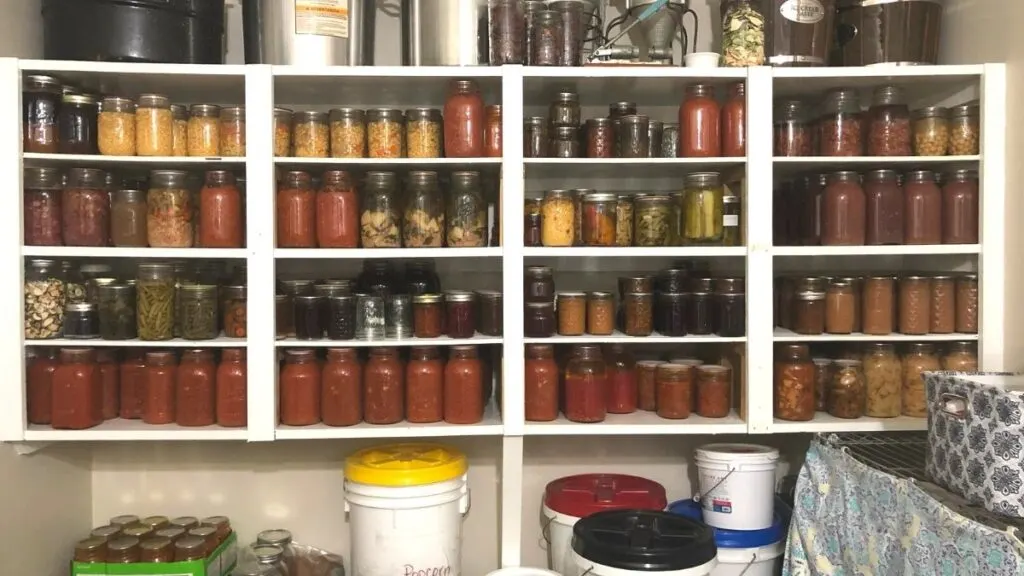
We live in a fairly small home (under 1400 sq ft) and I don’t have true pantry, just kitchen pantry cabinets. Therefore, I have to get creative when I store food. Some of the food goes in my kitchen cabinets – on those top shelves that are hard to get to – but not all of it will fit. I also store canned food in the mudroom and under some beds.
A few years ago after our third son left home, I was able to carve out more space in our back room to have a dedicated space for our canning storage – both finished jars and canning supplies. It’s been a luxury that I’ve never had before. For the last 20 or so years, I’ve just had to find space here and there in our home to store canned food.
The key is that I make notes of where I store what. I use some simple worksheets to keep track of what food I’ve preserved and where it’s stored. You can get a copy of the worksheets and a food preservation cheat sheet emailed to you. Just fill out the form below.
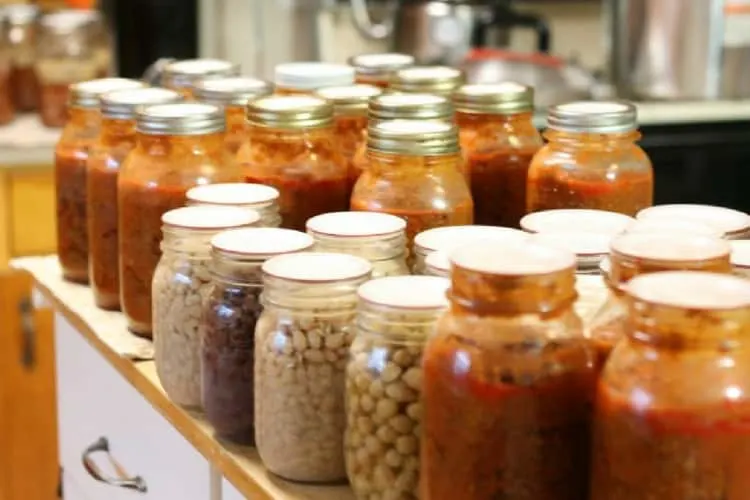
Tips for storing canned food
- Remove the bands and check the seal. Home canned food should be stored without the band. There are several reasons for this. First, it’s hard to really check the seal if the band is still on. Secondly, if the seal is broken during storage there’s a small chance that the pressure from the band could cause the jar to reseal. Lastly, the metal band could trap water under it during canning process and corrode during storage.
- Wash the jars. The outside of the jars can get a little yucky during the canning process. Maybe the food siphoned off a bit during the canning process. Or maybe you have hard water and there’s a white film on your finished jars. It’s totally fine, it just needs to be cleaned off before storing the jars. Usually just a simple wipe down with a dishcloth with water and a little white vinegar is all you need to clean the jars.
- Label everything. Blueberry jam and dewberry jam look very similar in the jar. I cannot tell you how much time I have wasted because I didn’t take a moment to label the jar. If you’re using metal lids, you can use a sharpie and just write on the lid. If you are using a reusable canning lid, a piece of masking tape works just fine. If you want something nicer, there are many fun labels on the market these days, you can even have custom labels made.
- Date the items. I know you think you’ll remember when you canned the stewed tomatoes but if you have any left over from last year when you start canning this year, they’ll look exactly alike. It’s hard to rotate your jars with first in, first out, if you don’t date them.
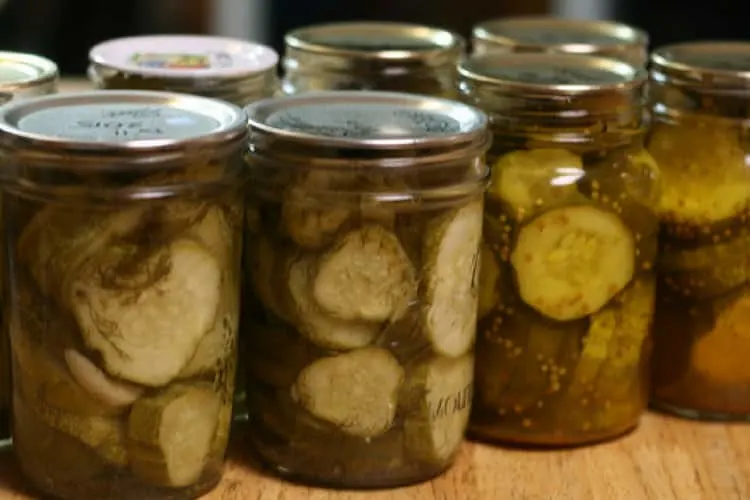
- Store in a cool, dark place. Home canned food should be stored below 95°F and away from direct sunlight. Ideal temperatures are 50°F-70°F but don’t worry too much about the ideal temperature. If you can handle staying in the area for long time, the food will be fine. We keep our a/c set to 78°F during the summer and our home canned food stores just fine. A cabinet works great, but so does a closet or under a bed. Just make a note of where you put what jars so you don’t forget.
- Store home canned food in a dry place. Dampness can cause the lids to corrode and possibly break the seals. We live in a humid area and our lids are just fine. But I certainly wouldn’t store canned goods in the bathroom closet. I’ve talked with several people with root cellars and the consensus is that a root cellar is not a good place for long term storage of home canned foods.
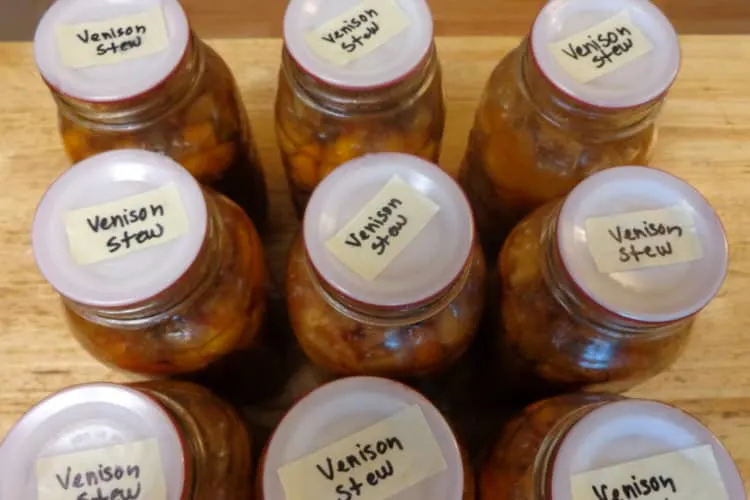
- Be careful stacking jars. Stacked jars can easily tumble and bump into each other which risks breaking their seals. If you must stack jars consider putting a piece of cardboard between them to give them stability.
- Don’t throw away the boxes. The boxes that your jars came in are the perfect size for storing the finished jars and the empty jars once the food has been eaten.
- Use sturdy shelving. Jars of home canned food are heavy; too heavy for many shelves. This is another reason not to stack finished jars. If you’re using your kitchen cupboards to store you home canned food make sure to not overfill them or you risk damaging the cupboards.
Canning food for you family is an act of love; an act that is time and labor intensive. Don’t let it go to waste by not storing the home canned foods properly.
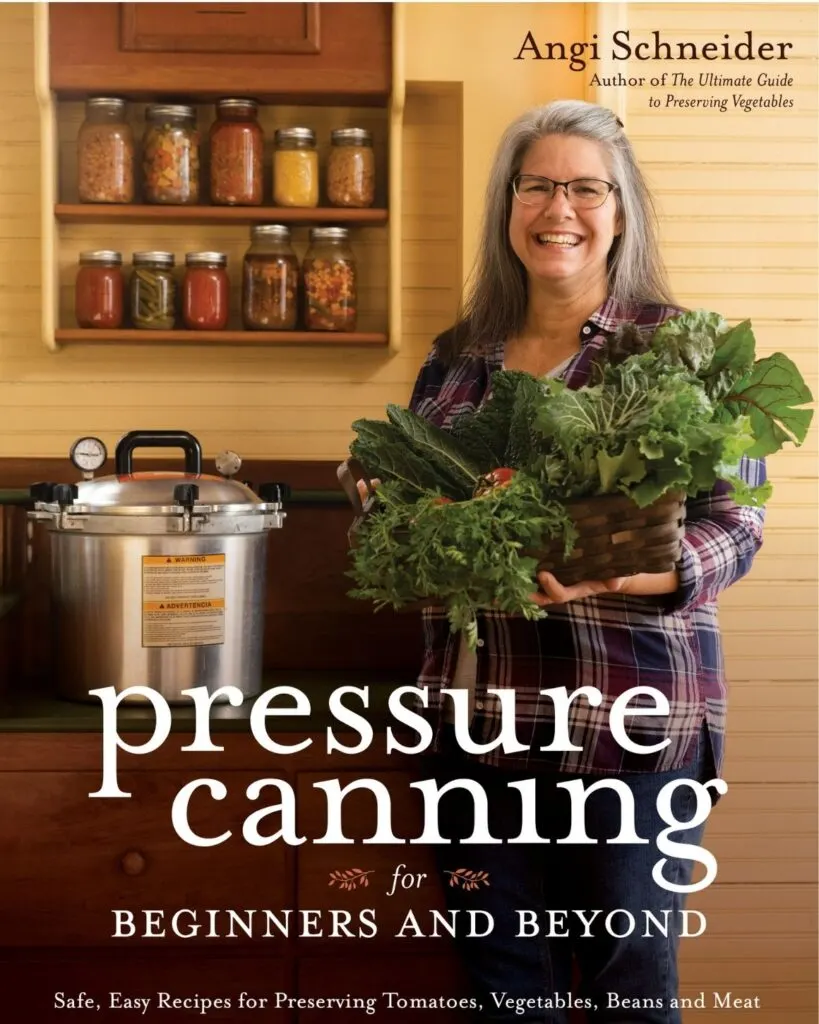
Pressure Canning for Beginners and Beyond
This is the book I wish I had in my early days of pressure canning. It’s full of information on how to safely can vegetables, legumes, and meats plus 94 recipes that are both safe and tasty. If you want to up your pressure canning skills, this is the book for you!
Storing Mason Jars
I’m often surprised by how difficult it seams to find space to store empty canning jars. For me, the easy solution is to just put them back where they were when they were filled. It takes a little maneuvering because I like to keep the filled jars up front, but it works surprisingly well.
If you’ve kept the boxes the mason jars originally came in, you can store the empty jars in them and then stack them on the pantry floor, under beds, in the attic. Wherever you have space…just be sure to write it down if it’s in an odd place.
The jars should be clean and dry before being stored. It’s also a good time to check the canning jars for cracks and nicks.
I prefer to store empty canning jars without the bands on them. I know some people keep them together but we live in a very humid climate and I don’t want the band to rust onto the mason jar.
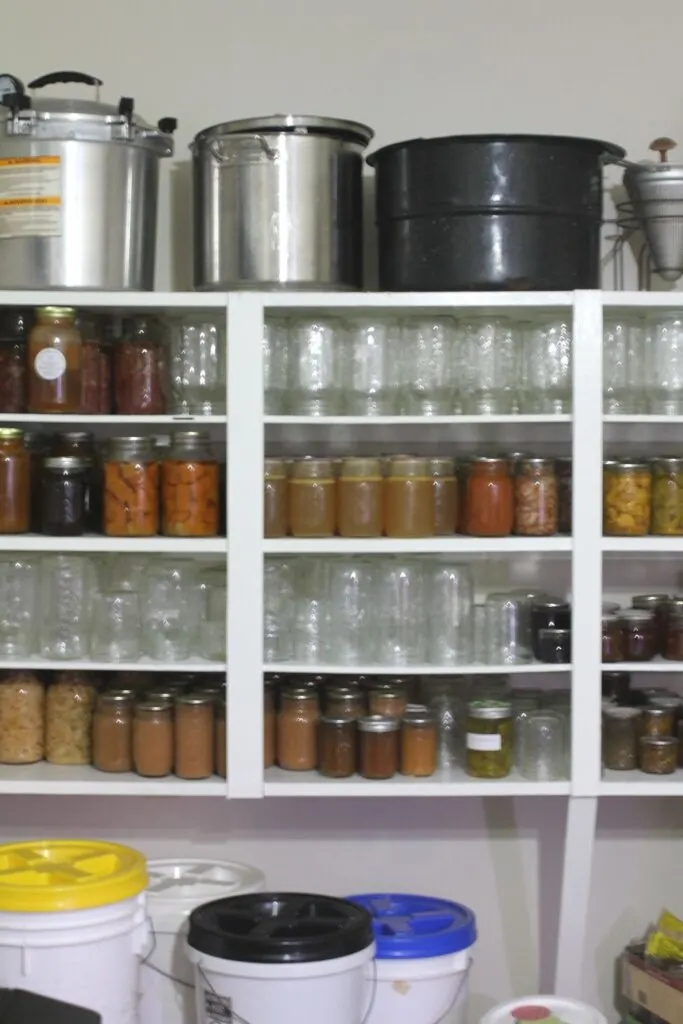
Storing Canning Supplies
Figuring out where to store canning supplies such as bands and lids can be tricky. So much depends on how your canning storage area is set up. I keep all these supplies in milk crates on shelves in our mudroom.
I have a crate for wide mouth band and lids and a crate for regular mouth bands and lids.
I wish it were super tidy and that I had nice little containers for my lids, but the reality is, I wouldn’t use them for long. It’s just easier to toss the reusable canning lids and bands in the crate and be done with it.
New metal lids always get kept in their boxes in the crates, otherwise they might get scratched and then are not usable.
I keep new bands in a bag in the crates. When I can, I use old bands and save the new ones to put on jars for gift giving. This way, I always have nice bands for gifts.
I also have a small drawer in my kitchen that we put used metal lids, bands and reusable lids, along with a few plastic storage lids. These are handy for when we need a lid or band to pop on an open jar before it goes in the refrigerator.
I keep citric acid and pectin in the crate with the regular mouth lids and bands. No reason for that crate other than it’s not as full as the wide mouth crate. I also keep the jelly strainer, canning funnel, and bubble removal tool in that crate.
Honestly, it doesn’t matter where you keep these things, you just need a designated space for them.
How long does home canned food last?
The official answer is 12-18 months. After that time, the quality of the food can start to diminish. However, as long as the jars remain properly sealed the food is safe to eat.
Just know that over time, the food will tend to get mushy and things like vinegar will get sharper in flavor.
Because of this, I try to just can what we need for the year and not more than that.
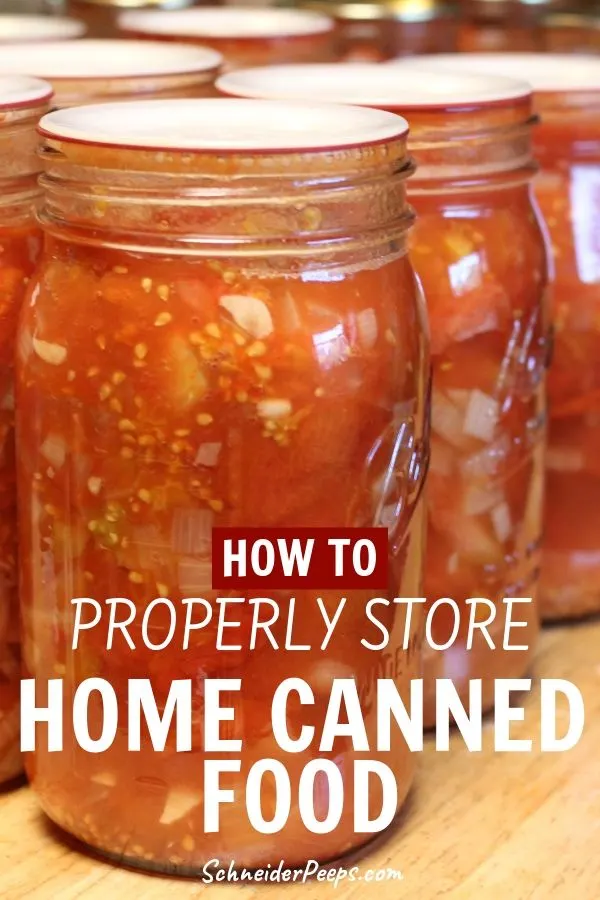
Do you can your own food? If so, share your storage tips with us in the comments.

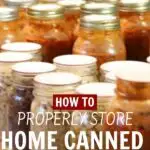
DeLois Haux
Thursday 28th of October 2021
I store canned goods in the spare bedroom closet. I have bought shelving and cabinets at thrift stores at reasonable prices that fit in the closet that holds a lot of my stored goods along with book shelves in that same room.
Angi Schneider
Friday 5th of November 2021
Great idea! Thanks for sharing.
DeLois Haux
Thursday 28th of October 2021
I store my canned goods in the spare bedroom closet. I have bought cabinets at thrift stores that have provided me with reasonable shelving. Foods that I use frequently such as pinto beans are stored in the kitchen a few jars at a time. Hope this post helps someone else. DeLois. I live in a state that stays pretty hot or warm year around and can't store outside.
Bridget
Wednesday 2nd of December 2020
I live in a small home without closets. I'm storing goods under the beds, coffee table and I'm running out of room. Do you think it'd be ok to store jars on their side under dressers? Thanks in advance!!
Angi Schneider
Wednesday 2nd of December 2020
Hi Bridget. Storing cans on their sides is not ideal as you run the risk of the lids being popped off. If you decide to try it anyway, I would only store low acid foods on their sides. The acid in pickles and tomatoes can corrode the lid over time and you don't want to open a jar of food and see rust all under the lid. If you can find space for a stand alone shelving unit that would be better.
Donna Vargas
Saturday 1st of August 2020
If you have a non-working frig it makes great storage for home canned food. We also have a hallway so we opened a inner wall and built shelves perfect size for canning jars.
Angi Schneider
Sunday 2nd of August 2020
Those are great ideas! Thanks for sharing Donna.
Julie
Friday 13th of July 2018
I live in California and have no a/c only fans. It gets very hot in the house. Can I store my canned goods in the refrigerator?
Angi Schneider
Friday 13th of July 2018
You can but I think they would be fine in the house, maybe under the bed or on the bottom of a closet. If the house isn't too hot for you to live in it's not too hot for your canned food. The USDA recommends not storing home canned food above 95F (https://nchfp.uga.edu/publications/usda/GUIDE01_HomeCan_rev0715.pdf) the food won's spoil but might lose quality. You might try using a thermometer and testing a few areas this summer to see when you can store your jars without it being above 95F for very long. There's nothing wrong with storing your jars in the refrigerator other than them taking up valuable refrigerator space.